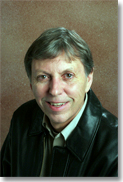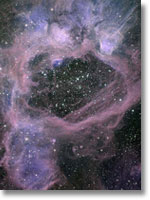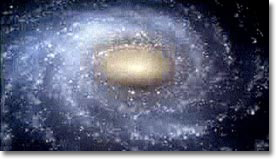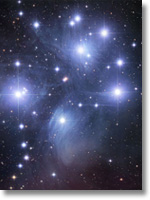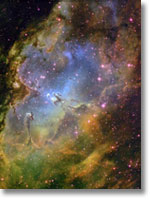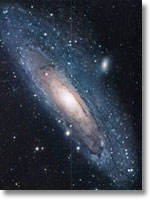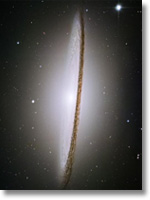Readable and engaging… ways of reconciling science and religion.
— Patricia Monaghan, American Library Association
A delightful romp through the labyrinths of philosophy, theology, and
science.… This book is very smart, very literary, very thrilling — a fine
read.
— Dr. Larry Dossey, author of Space, Time and Medicine
Whether one will agree or disagree, powerful arguments are presented
for one to consider.
— Edgar Mitchell, Apollo 14 Astronaut Lunar Module Pilot
Bernard Haisch, an astrophysicist whose work has been reported in this
magazine… also trained to be a priest, and this book is his attempt to
reconcile his scientific knowledge with the idea of a purposeful universe.…Whether
or not you agree, it's a compelling read.
— Marcus Chown, New Scientist magazine
Questions and Answers
Is there a God?
There are good reasons to think so. It is now accepted in astrophysics
that several key properties of the Universe and the laws of physics have
"just right" values that enable life to arise and evolve. This is essentially
undisputed. The explanation for this fine-tuning that appeals to most scientists
is that this means there must be a huge number of other Universes, perhaps
even an infinite number, in which the laws of physics are different. Life
as we know it could never arise in such universes. Our universe is just
one of these, and we find ourselves here because we could not have originated
anywhere else. All universes arise at random, probably from quantum fluctuations.
This implicitly assumes that some kinds of laws or fields preexist to
allow quantum fluctuations to arise. No laws, no action. And of course
this also implies that these universes, ours included, have no purpose
because they arise out of random processes. I am simply proposing that
rather than purposeless laws or fields preexisting, it is a supreme intelligence
that preexists, and that the ideas of this intelligence gives rise to laws
of physics that create universes, so call it God. Both origin explanations
are equally logical and equally beyond proof at this time, but there is
a purpose behind the God interpretation.
What is The God Theory?
The idea goes back to one of the founders of modern astrophysics, Sir
James Jeans, who wrote that the universe seemed to him to be more like
a great thought than like a great machine. Well, whose great thought might
that be? So I start with the concept of a supreme intelligence that has
to be completely consistent with the Big Bang, evolution and other scientific
knowledge. The God Theory then includes a very logical and compelling reason
for why such a supreme intelligence would create universes in the first
place: to transform infinite potential into experience. The experiences
of the life forms (such as human beings) possible in the many different
universes become the experience of the supreme intelligence. We are all
sparks of God, experiencing his/her creativity. This has nothing to do
with intelligent design: God does not need to microengineer or micromanage
the evolution of life forms. The ideas of God are the basic laws of physics
and the associated physical constants.
Is the God you are proposing at odds with science?
Not at all. Whether our universe originated by some random process or
out of the ideas of a supreme intelligence cannot be determined by present
day science. Since both lead to the same "Big Bang" origin of our universe,
it does not affect science one way or the other. Science very accurately
describes the Universe as it is. But science has no special claim on the
ultimate origin of our universe and the myriad others that may exist in
the current view of astrophysics and its multiverse inflation theories.
Science has no way of knowing the ultimate origin of our universe and whatever
others may exist. I suggest however that spiritual human experiences do
open a door to knowing.
How can you have spirituality without religion?
I propose that spirituality should be viewed as a branch of knowledge
alongside biology, astronomy, chemistry, etc. It is a branch of knowledge
concerning an essence of our being and our consciousness that transcends
physical matter. Many scientists would simply deny that there is such a
thing, but that is opinion and dogma masquerading as fact. Since present
day science does not study anything other than the physical, it has nothing
valid to say about whatever non-physical realities may exist which can
be called spiritual.
One can study spirituality without religion, and indeed I propose that
ultimately one will not need the "middleman" of religion to study the laws
of spirituality (whatever they may be) any more than one needs a religion
of physics to study physics. Both the historical legacy and the present
day practice of religion have a mixed record. Religion has often been used
to exploit, conquer and slaughter, which of course is grossly contradictory
to genuine spirituality.
Why do most scientists reject the idea of a supreme intelligence?
Much of the hostility of science toward God is a reaction against religious
dogmatism and outright persecution of rational thinkers in centuries past,
such as Galileo and Giordano Bruno. But there is also a sense in science
that understanding of the ways the world and the Universe work has been
one of steady progress, systematically replacing mythology with genuine
knowledge. It becomes tempting to extrapolate these successes to an ultimate
understanding of everything using the tools and methods of science. Next
time you read a science-oriented book for the general public, note how
frequently "triumph" or "triumphantly" is used to describe a discovery.
There is a degree of arrogance and hubris at work: we, the sophisticated
scientists, are smarter than the less educated masses who cannot appreciate
the complexity of science and have no need for the superstitions of the
hoi polloi. Indeed, a mind set can arise in which it becomes virtually
impossible to conceive of any reality other than the reductionist, materialist
perspective. The community one is immersed in does determine and reinforce
a consensus view, and that is true of the scientific community. One can
easily find the view expressed that since science has found no evidence
of God, there cannot be a God. This overlooks the fact that science has
neither the tools nor even the concepts to actually search for evidence
of a supreme intelligence. If you loose your keys in the dark, but look
for them under the lamppost because that's where the light is, you won't
find any evidence of your keys.
How does consciousness arise out of matter?
Well, actually, I don' believe it does. I think that ultimately it is
the other way around: that the origin of this universe and all others that
may exist lies in the will of a supreme consciousness, a consciousness
that we all possess, in varying degrees. Somehow that consciousness created
a physical universe. I think we will discover in this century that we shape
our reality via consciousness to a much greater degree than is presently
acknowledged. The study of consciousness will, I believe, take center stage
in science in the decades ahead, and I do not mean simply neurobiology
explaining, and thereby in effect explaining away, consciousness.
What are the biggest problems with organized religion?
There are several major problems that affect, or have affected, most
religions to some degree or other. The worst is intolerance, denying the
legitimacy of beliefs not in accord with a given religion, claiming sole
authority and in the worst cases outright persecution and suppression of
dissent. Just consider the Inquisition. Intolerance is unfortunately still
a major problem in some branches of religion. The fairy tale nature of
some of the beliefs is also a problem, teaching notions of heaven and hell
that rational people cannot accept. If you actually try to imagine a never
ending state of anything, that can become pretty horrifying. Something
that truly never, ever ends, no matter how good it looks at the outset,
would become a nightmare eventually. Remember, Woody Allen said "Eternity
is very long, especially toward the end." Heaven cannot be what most religions
teach. Then there is the depiction of a God who is capable of hate and
anger, as if he were a petty tyrant out to judge and punish. This is a
dreadfully limiting view of a benevolent supreme consciousness. Lastly
there is the frequent misuse of religion for political and economic ends.
None of these things make any sense, and that is why many intelligent
people have turned away from religion.
Is there a purpose for my life?
Definitely. Our purpose in life is to create God's experience of his
own infinite potential. We are, each one of us, tiny mortal flames of an
infinite benevolent immortal consciousness seeking experience. God comes
into this world through each of us. Some people do bad things. How can
they still be manifestations of God? The answer is that unlike some infinite
perfect realm of bliss, a real world comprised of matter and living beings
capable of novel experience requires polarity. You can't experience light
without the contrast of darkness. Heat is only hot in comparison to cold.
So there has to be the possibility of "not good" to allow good to exist
in the created universe. Factor in that the key to having a genuinely novel
experience is free will. Free will plus the necessity of having some "not
good" alongside the good can lead to some individuals creating great evil.
To reconcile that with justice takes us into the concept of karma. But
all in all, life is quite an adventure and that is the purpose of it. God
participates in our life adventure because we really are him made manifest.
We just had to forget that to make a novel, free-will based life experience
possible.
How can you be so sure of The God Theory?
I cannot be certain of it, but it is a sophisticated, rational and,
perhaps, elegant explanation of otherwise intractable paradoxes and dilemmas.
It does not in any way contradict science. It takes seriously the mystical
and prayerful and sometimes just extraordinary spontaneous experiences
that people have reported throughout the ages. Physicist Werner Heisenberg
wrote:
"It is probably true quite generally that in the history of human thinking
the most fruitful developments frequently take place at those points where
two different lines of thought meet. These lines may have their roots in
quite different parts of human culture, in different times or different
cultural environments or different religious traditions: hence if they
actually meet, that is, if they are at least so much related to each other
that a real interaction can take place, then one may hope that new and
interesting developments may follow."
In The God Theory I am trying to bring about a convergence of the spiritual
and the scientific perspectives.
Can science and spirituality be bridged?
Not only can they, they must if science is to evolve. I think that the
major discovery of this century will be the recognition that consciousness
is endowed with unknown (at least to reductionist, materialist science)
creative potential. Our consciousness is tightly leashed when it comes
to literally creative abilities, and by and large for good reason. If we
could easily manipulate reality with pure conscious intent, the world would
be in utter chaos. But ultimately I suspect that consciousness does have
that capability and that the rigorous study of that will become a part
of science and may in fact become the dominant concern of science. So I
see science moving into the spiritual realm not to debunk it or explain
it away, as tends to be the case today, but to open a new vista that extends
much further into new territory than most scientists even imagine nowadays.
What is the zero-point field in physics?
The three fundamental forces other than gravity known to physics all
possess minimum energy states according to quantum laws that are greater
than zero. Specifically for the electromagnetic force, there is an electromagnetic
zero-point field with zero-point energy even at a temperature of absolute
zero. This zero-point energy is what keeps liquid helium from freezing
to a solid even at zero temperature. However there is major disagreement
in physics on whether to interpret this field as real or virtual. There
are major problems with having a real field, but it is logically difficult
to argue away the reality of the field.
Metaphorically this field may be described as an invisible, uniform
sea of light underlying the Universe. Unfortunately a great deal of not
well-informed speculation has become associated with such a field. I have
heard people proclaim "God is the zero-point field." It's not that simple.
What is possible is that the zero-point field might be the mechanism whereby
matter acquires its property of inertia, of mass. My colleagues and I have
published numerous papers on this in mainstream physics journal and have
been funded by NASA and by Lockheed Martin. It remains to be seen whether
or not this interpretation of the zero-point field is correct, In The God
Theory I speculate, and let me emphasize speculate, about the possibility
that this electromagnetic zero-point field might in some sense be related
to a "light of creation" of the physical world concept that you find in
spiritual traditions.
Preface
This view suffers from three problems.
First of all, quantum fluctuations are a key ingredient of inflation
theories that attempt to address how our universe, and myriad others, came
into being. The problem is that quantum fluctuations presuppose the existence
of quantum laws. If there truly were no quantum laws or any other laws
whatsoever, nothing could happen. No laws, no action. The origin of universes
as a result of quantum laws, inflation fields, or other arcane properties
of string theory depends upon the preexistence of those laws or fields.
And so even the skeptical scientist cannot avoid taking that on faith.
The second problem is that none of the other universes can ever be observed,
not even in principle, since trying to measure across universes with different
fundamental laws would be like using a microphone to observe the moon or
using a telescope to record a rock band. So yet a second article of faith
is required of the modern scientist: the existence of an infinite number
of unseen universes.
The final problem is more personal. If we are nothing but physical beings
originating by chance in a random universe, then there really can be no
ultimate purpose in our lives. This is not only bad news for us individually,
it undermines the ethical and moral underpinnings of society and civilization.
I propose a theory in this book that does provide a purpose for our
lives while at the same time being completely consistent with everything
we have discovered about the universe and about life on earth, in particular
the Big Bang, a 4.6 billion-year-old earth, and, of course, evolution.
The single difference between the theory I propose and the ideas current
in modern astrophysics is that I assume that an infinite conscious intelligence
preexists. You cannot get away from the preexistence of something, and
whether that is an ensemble of physical laws generating infinite random
universes or an infinite conscious intelligence is something present-day
science cannot resolve, and indeed one view is not more rational than the
other.
One might argue that one view is supported by evidence and the other
is not. I would agree one hundred percent. The evidence for the existence
of an infinite conscious intelligence is abundant in the accounts of the
mystics and the meditative, prayerful, and sometimes spontaneous exceptional
experiences of human beings throughout history. The evidence for random
universes is precisely zero. Most scientists will reject the former type
of evidence as merely subjective, but that simply reduces the contest of
views to a draw: zero on both sides.
What I propose is an infinite conscious intelligence -- so let's call
it God -- who has infinite potential, whose ideas become the laws of physics
of our universe and others, and whose purpose in so doing is the transformation
of potential into experience. The difference between being able to do something
and actually doing it is vast: making it happen, experiencing what it feels
like, savoring the sensations are the tremendous difference between theory
and practice. Playing the game is far more satisfying than reading the
rules.
Astrophysicist Sir James Jeans wrote in the 1930s, "...the universe
begins to look more like a great thought than like a great machine." So,
too, I am proposing, in The God Theory, that ultimately it is consciousness
that is the origin of matter, energy, and the laws of nature in this universe
and all others that may exist. And the purpose is for God to experience
his potential. God's ideas and abilities become God's experience in the
life of every sentient being. What greater purpose could there be for each
of us humans than that of creating God's experience? God experiences the
richness of his potential through us because we are the incarnations of
him in the physical realm.
That's what it's all about.
